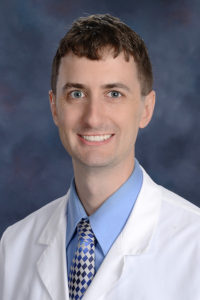Over the past year, St. Luke’s University Health Network (SLUHN) radiologist Karl Yaeger, MD, and his colleagues have worked with an international team of researchers fielded by GE Healthcare to develop the industry’s first x-ray system with an embedded AI algorithm to detect disease.
BETHLEHEM, Pa. (PRWEB) June 24, 2019
Not long ago understanding and harnessing the power of artificial intelligence (AI) to improve medical care was considered futuristic, akin to science fiction. Over the past year, St. Luke’s University Health Network (SLUHN) radiologist Karl Yaeger, MD, and his colleagues have worked with an international team of researchers fielded by GE Healthcare to develop the industry’s first x-ray system with an embedded AI algorithm to detect disease. This technology, the portable Optima XR240amx featuring Critical Care Suite*, is designed to alert the clinical team to the presence of potentially life-threatening collapsed lungs (pneumothorax) within seconds of image acquisition at the bedside.
GE Healthcare submitted the Critical Care Suite* to the FDA for review last November. It is the first time an imaging system with AI-embedded clinical algorithms is being submitted to FDA for consideration. Other AI-driven applications are available to help physicians to more quickly diagnose strokes using CT scans and aid in wrist fracture detection.
The GE Healthcare AI-enhanced Optima XR240amx featuring Critical Care Suite* has the potential to help prioritize x-ray image interpretation, then confirmation of the condition by the radiologist.
Chest x-rays are the most common diagnostic imaging test performed in hospitals, frequently done on critical care units or in emergency rooms. Many are ordered STAT, or urgent, some for reasons other than true clinical necessity. As a result, scores often must wait in a long queue of scans to be reviewed by a radiologist in the order they’re received regardless of their suspected or eventual findings. Delayed diagnosis of a large pneumothorax could be life-threatening.
According to global healthcare knowledge provider BMJ, some 74,000 Americans suffer collapsed lungs each year, resulting from trauma, cigarette smoking, drug abuse and certain medical conditions.
In helping develop the AI for the Critical Care Suite, Dr. Yaeger and his team at SLUHN reviewed hundreds of x-rays without and with pneumothoraces of all sizes and degrees of severity. These were then processed with the deep-learning software algorithm to determine its accuracy.
Dr. Yaeger says he’s enthused to be a part of this pioneering effort ushering in this “new wave” of healthcare technology. He’s optimistic at the potential of the AI-powered Optima XR240amx featuring Critical Care Suite* to serve as an “untiring and undistractable partner,” a vital, and possibly life-saving, link between the bedside and the radiology reading room.
“The goal of this application of artificial intelligence is to increase the speed and accuracy of prioritizing these possibly-lethal conditions, so they are confirmed and treated sooner rather than later,” says Dr. Yaeger. “It’s ultimately about improving patient care and saving lives.”
*Critical Care Suite is 510(k) pending at FDA. Not available for sale.
Media Contact:
Sam Kennedy, Corporate Communications Director, 484-526-4134, samuel.kennedy@sluhn.org
About St. Luke’s
Founded in 1872, St. Luke’s University Health Network (SLUHN) is a fully integrated, regional, non-profit network of more than 15,000 employees providing services at 10 hospitals and 300 outpatient sites. With annual net revenue greater than $2 billion, the Network’s service area includes 10 counties: Lehigh, Northampton, Berks, Bucks, Carbon, Montgomery, Monroe and Schuylkill counties in Pennsylvania and Warren and Hunterdon counties in New Jersey. Dedicated to advancing medical education, St. Luke’s is the preeminent teaching hospital in central-eastern Pennsylvania. In partnership with Temple University, St. Luke’s created the Lehigh Valley’s first and only regional medical school campus. It also operates the nation’s longest continuously operating School of Nursing, established in 1884, and 28 fully accredited graduate medical educational programs with 226 residents and fellows. St. Luke’s is the only Lehigh Valley-based health care system with Medicare’s five- and four-star ratings (the highest) for quality, efficiency and patient satisfaction. St. Luke’s is both a Leapfrog Group and Healthgrades Top Hospital and a Newsweek World’s Best Hospital. In 2019, three of IBM Watson Health’s 100 Top Hospitals were St. Luke’s hospitals. St. Luke’s University Hospital has earned the 100 Top Major Teaching Hospital designation from IBM Watson Health seven times total and five years in a row. St. Luke’s has also been cited by IBM Watson Health as a 50 Top Cardiovascular Program. Utilizing the Epic electronic medical record (EMR) system for both inpatient and outpatient services, the Network is a multi-year recipient of the Most Wired award recognizing the breadth of the SLUHN’s information technology applications such as telehealth, online scheduling and online pricing information. St. Luke’s is also recognized as one of the state’s lowest cost providers.

